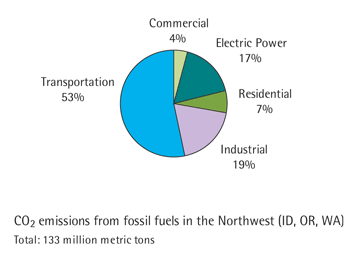A couple of weeks ago I was in Vancouver, BC at a conference where it seemed like everyone was talking about a new book called Growing Cooler: The Evidence on Urban Development and Climate Change.
Reviewing dozens of empirical studies, the book’s central argument is that urban form is inextricably linked to climate. Low density sprawl has been a principal contributor to North American climate emissisons. And by the same token, smart compact development—the kind that fosters less driving—is essential to curbing climate change.
From the executive summary:
…if sprawling development continues to fuel growth in driving, the projected 59 percent increase in the total miles driven between 2005 and 2030 will overwhelm expected gains from vehicle efficiency and low-carbon fuels. Even if the most stringent fuel-efficiency proposals under consideration are enacted, notes co-author Steve Winkelman, “vehicle emissions still would be 40 percent above 1990 levels in 2030—entirely off-track from reductions of 60-80 percent below 1990 levels by 2050 required for climate protection.”
This is exactly right. Transportation emissions, whch are mostly (but not entirely) auto-based, account for over half of the Northwest’s climate emissions from fossil fuels. Under any realistic climate program, it is imperative that we reduce emissions from transportation. But even the rosiest assumptions about fuel efficiency and biofuels won’t get us there: we’ll need to reduce driving. The best way—and maybe the only meaningful way—is to invest now in climate-friendly urban form. Now, because the neighborhoods we build today will be with us for many decades. They will create the conditions of possibility—or impossibility—of reducing our transportation emissions.
 |
I suppose I should mention that I haven’t, you know, actually read the book yet. I’m just passing it along to the many smart readers of this blog who like to stay informed about these issues. But I do know some of the contributing authors, and I can vouch for their smarts. The full text is available here, as a big pdf.








Steve Davis
Which leads to the fantastic question: Every big national discussion on climate completely leaves out land use and smarter development for the most part. Yet as you’ve pointed out, it’s a huge component of our success or failure. Growing Cooler is a good step in the right direction, but how do we inject it into the debate so that no one can talk about warming without talking about better urban form, smart growth—whatever you want to call it?
Morgan Ahouse
I love this question, though I don’t have the answer.One thing I do believe is that we need to blow apart our categorical ways of thinking about the world that encourage us to think about nouns (like roads, emissions, clean water, density, etc) instead of the systems and the interrelationships among systems. Last night, I heard from KC Golden that the cap & trade policy they’re helping broker (I suspect the Western Climate Initiative, though he didn’t say) includes funding for green collar job training.